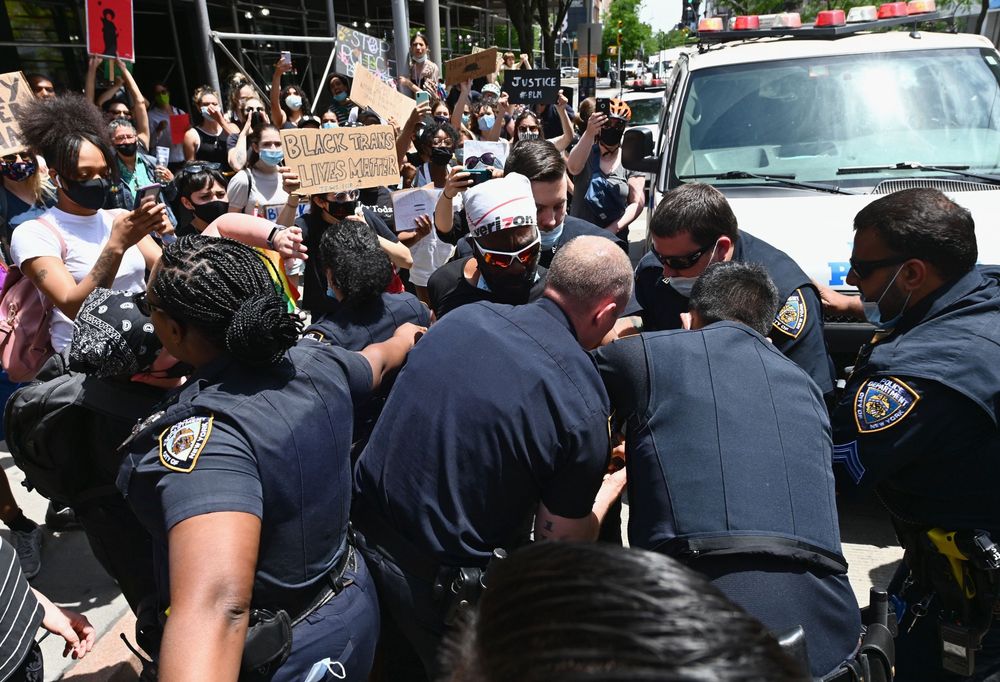Resisting is desperation. We know that this is a false arrest, that we are not guilty — but we also know that the moment we are placed in a squad car, we begin a slow, grinding procession through a system that rarely delivers the justice it purports to. Plea deals we shouldn’t have to take, the only means of avoiding the harsher penalty that comes of maintaining our innocence. A tangled web of district attorneys and judges elected to protect us but instead acting in league with private prisons.
Resisting is negotiation. We don’t want our mothers to be disappointed in us; we don’t want our employers to discover this unfounded predicament; we don’t want our children to be ashamed of us; worst of all, we know we don’t have the money to make bail or hire an effective attorney. If we can just make them see we weren’t doing anything, we can clear this all up.
Resisting is reflex. We know it deeply, because we know the stories of those who came before us: adrenaline threat supersedes rational thinking. Our strength is our only protection from a world of endless fear. We resist physically not because we want to, but because there is no other way to communicate when the people arresting us are deaf to our words.
The inhumane choice of pleading guilty to a five-year sentence despite knowing our innocence, just to avoid a potential 25-year sentence that we don’t have the economic means to fight. This is why we resist.
Maybe if we were Reese Witherspoon, we could confidently get in an officer’s face to question why they are detaining our loved one for driving under the influence; we could turn around and argue not to be handcuffed without the fear of brutality and excessive force. But we aren’t extended that privilege. Instead, we are Philando Castile; our partner isn’t Reese, but Diamond Reynolds.
Maybe if we were White, we could wrestle two cops to the ground, beat them with their own baton, then get up and drive away in their police car without them ever drawing their weapon.
https://twitter.com/TalbertSwan/status/1076980077303382017
Instead, we are Rayshard Brooks, shot twice in the back as our car sits idle in a Wendy’s parking lot. This is why we resist.
If we do not, if negotiations fail, our entry is through the jail doors, captive until trial unless we make bail — a system that, according to a study conducted by the ACLU and Color of Change, is manipulated by a $2 billion bail bond industry. A bail as low as $500 can be unaffordable for many Americans. In fact, 40% of Americans say they could not afford an unexpected $400 expense.
And once inside, other demons descend. In a 1986 study by the National Center on Institutions and Alternatives, approximately half of suicides inside the carceral system happen within the first 24 hours. Especially after a false arrest, isolation, terror, and helplessness all compound the risk.
This story of Kalief Browder is by now well known, but it bears repeating. In 2010, the 16-year-old entered Rikers Island after a false arrest — and despite never having been convicted, he stayed there three years, two of them in solitary confinement. While inside, he attempted suicide at least five times; even after his release in 2013, he continued to be plagued by psychological problems, ultimately taking his own life in 2015. This is why we resist.
If we do make it to our court date, our orange jumpsuit adding to presumption of our guilt by sheer appearance, more trouble awaits. Overworked and underpaid public defenders. The inhumane choice of pleading guilty to a five-year sentence despite knowing our innocence, just to avoid a potential 25-year sentence that we don’t have the economic means to fight. This is why we resist.
A 2017 paper by Carlos Berdejó of Loyola Law School finds significant racial disparities in plea deals: White defendants generally get better deals than their black counterparts, and are more likely to avoid incarceration for low-level offenses. According to Berdejó’s research, White defendants are 25% more likely than Black defendants to have their principal charge dropped or reduced to a lesser charge. Because of this, White defendants charged with felonies are less likely than Black defendants to be convicted of a felony. (Similarly, cases involving White defendants charged with misdemeanors are 75% more likely to end in no conviction, or a conviction for a crime that carries no jail time, than a Black defendant accused of the same crime.) This is why we resist.
You don’t have to know the data to understand the injustice of the criminal justice system. You don’t have to be familiar with the research to understand that in the eyes of law enforcement, being Black carries an undue burden of guilt. You don’t have to know the economic data that keeps the criminal justice system running. All you have to do is be Black in America. Systemic racism and police brutality are a rite of passage that no culture should have to experience. And if you are not Black? Perhaps now you have a better understanding of what we’re facing.
So before you utter, “you’re making it worse,” let us hear how you will help in balancing the scales of justice to be fair and just.
